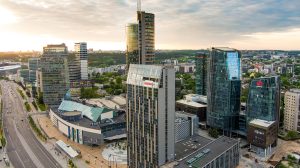Leaders of the six Western Balkans states and the European Union met in the Bulgarian capital Sofia on May 17 for their first summit in 15 years.
“The summit was a success,” President of the European Council Donald Tusk told the press after the event. “The EU is and will continue to be the most important partner for the Western Balkans. We discussed how to improve links – economic, digital, infrastructural – with the region. The connectivity programme is not an alternative or substitute to enlargement. It is the way to use more effectively the time between now and tomorrow. I see no future for the Western Balkans other than European. There is no alternative.”
While the summit did not give any of the six countries a firm date for when they might join the bloc, the declaration released at the close of the day’s talks encourages all of the Western Balkan countries to continue on the path of EU-oriented reform.
“The EU welcomes the shared commitment of the Western Balkans partners to European values and principles, and to the vision of a strong, stable and united Europe, underpinned by our historic, cultural and geographic ties and by our mutual political, security and economic interests,” reads the Sofia Declaration, which goes on to stress the primary importance of democracy and the rule of law, especially the fight against corruption and organised crime, good governance, as well as respect for human rights and rights of persons belonging to minorities.
“The effective implementation of reforms rests on these foundations. Civil society and independent media play a crucial role in the process of democratisation.”
The Sofia Priority Agenda, which sets out concrete steps to be taken by member states, underlines the need to strengthen the rule of law and governance, and reaffirms the EU’s commitment to “enhancing support for judicial reform and efforts to fight corruption and organised crime, including capacity building for corruption prevention.”
On the sidelines of the main summit, Greek Prime Minister Alexis Tsipras met with his Macedonian counterpart Zoran Zaev in an attempt to resolve an ongoing dispute regarding the name of Macedonia.
“We have made good progress, but are not in a position yet to talk about an agreement,” said Mr Tsipras. “We would both like to see a result in time for the [EU] summit in late June.”
However, Bulgaria’s Prime Minister, Boyko Borissov, who hosted the summit, told the press that Greece and Macedonia had “essentially clinched a deal” but that “it was their secret that will be shared first at home.”
Croatia has offered to hold a new summit dedicated to the Western Balkans during its EU presidency in 2020.





Add Comment